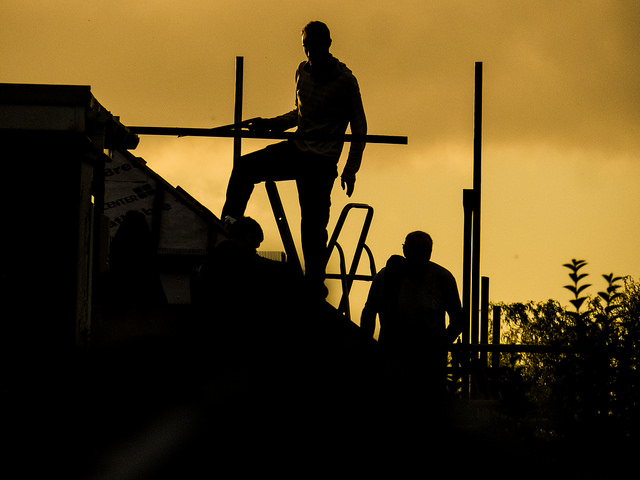Unlock the Magic in Your Story Now
Get the Free 20 questions to Ask Before Launching Your Idea workbook when you sign up for occasional updates.
Get the Free 20 questions to Ask Before Launching Your Idea workbook when you sign up for occasional updates.
A Tale Of Two Managers
filed in Marketing, Storytelling, Strategy
 My local bank manager, at the branch five minutes walk from my home, works hard to help customers navigate the bank’s new automated systems and services. He’s on hand to show everyone depositing cash how to bypass a teller and make a deposit using the machine in the foyer.
My local bank manager, at the branch five minutes walk from my home, works hard to help customers navigate the bank’s new automated systems and services. He’s on hand to show everyone depositing cash how to bypass a teller and make a deposit using the machine in the foyer.
The bank manager at the branch where I choose to bank (three suburbs and a thirty-minute tram ride away), works hard to get to know his customers. He chooses to man the customer service desk so that he can hear his customer’s stories. He knows his customers by name and prioritises understanding their goals before serving them. He prides himself on making sure they are paying less interest and incurring fewer fees.
Both managers care, but there’s a subtle distinction in how they choose to serve. The second bank manager wins because he cares less about finding customers for his products and more about finding the right products for his customers. And he goes home knowing that he’s done work he’s proud to have done.
Image by Spixey
Share this article
How Matters
filed in Storytelling, Strategy, Worldview
 The woman clearing tables in the Qantas airport lounge is almost invisible to the many preoccupied travellers she cleans up after. People are anxious to charge their devices, grab a bite to eat and catch their flights. The lounge attendant scrapes plates of half-eaten food and piles them on a trolley to take back to the kitchen. Sometimes people stop to ask her where they can get a drink or an extra spoon, but they don’t really see her.
The woman clearing tables in the Qantas airport lounge is almost invisible to the many preoccupied travellers she cleans up after. People are anxious to charge their devices, grab a bite to eat and catch their flights. The lounge attendant scrapes plates of half-eaten food and piles them on a trolley to take back to the kitchen. Sometimes people stop to ask her where they can get a drink or an extra spoon, but they don’t really see her.
Out of the corner of her eye, she notices a passenger, his feet awkwardly perched on the table, balancing a Macbook on his knee. It’s a bad angle to work at, but at least he’s got a socket and WiFi. Two minutes later, the attendant appears in front of him with a low stool to rest his feet on. She helps him to turn his chair, so he’s not straining his back while he works. Then she silently returns to wiping tables and clearing plates as the travellers busy themselves all around her.
You may not always get to choose the work, but how you do it is always a choice.
Image by Ian
Share this article
The Power Of Scarcity
 Demand for anything is always greater when supply is limited. People want what they can’t have, and so scarcity creates value. Scarcity is not just about managing the availability of resources and limiting supply—it can be the foundation of a successful business model.
Demand for anything is always greater when supply is limited. People want what they can’t have, and so scarcity creates value. Scarcity is not just about managing the availability of resources and limiting supply—it can be the foundation of a successful business model.
When Howard Schultz expanded Starbucks, he knew that it was the feeling of community and connection, not just a decent coffee that was scarce. Boutique hotels changed the definition of luxury by understanding that people craved delight, not only a comfortable bed and fresh towels.
As the world around us evolves what’s in short supply changes too. When everything is automated, personal service becomes more valuable. When commodities are plentiful, artisans flourish. When we can buy the factory-made on every street corner, we covet the thing that’s made by hand.
Every successful organisation and entrepreneur thrives not by knowing what’s selling—but by understanding what people want more of and don’t yet have.
Image by Thomas H
Share this article
The Number That Matters
filed in Strategy, Success, Worldview
 Every so often I look at the list of readers who have subscribed to my blog but have stopped opening the emails they signed up to receive. When I see that they’re no longer interested, I unsubscribe them. I’ve personally done this almost 10,000 times over the past seven years. It’s harder than you think at first because we’ve been conditioned to believe that the only number that matters is the biggest one. What’s more important to me, and I’m guessing you too, is to reach and serve the people I can make the most difference to. That means respecting the choice of the people who are no longer engaged.
Every so often I look at the list of readers who have subscribed to my blog but have stopped opening the emails they signed up to receive. When I see that they’re no longer interested, I unsubscribe them. I’ve personally done this almost 10,000 times over the past seven years. It’s harder than you think at first because we’ve been conditioned to believe that the only number that matters is the biggest one. What’s more important to me, and I’m guessing you too, is to reach and serve the people I can make the most difference to. That means respecting the choice of the people who are no longer engaged.
What would our world look like if we doubled down on only making work for the people we can move and only paid attention to the things that have the power to change us?
Image by Karina Yeznaian
Share this article
Understanding The Arc Of Your Customer’s Story
filed in Marketing, Storytelling, Strategy
 The plot of every story begins with an inciting incident—the revelation of a problem the hero must overcome. Harry Potter’s offer of a place at Hogwarts School of Witchcraft and Wizardry. Cinderella’s invitation to the ball. Buzz Lightyear’s arrival on Andy’s birthday. Everything we know about the hero’s circumstances up until that moment is the backstory. The inciting incident compels the hero to act until the problem is resolved.
The plot of every story begins with an inciting incident—the revelation of a problem the hero must overcome. Harry Potter’s offer of a place at Hogwarts School of Witchcraft and Wizardry. Cinderella’s invitation to the ball. Buzz Lightyear’s arrival on Andy’s birthday. Everything we know about the hero’s circumstances up until that moment is the backstory. The inciting incident compels the hero to act until the problem is resolved.
As entrepreneurs and organisations with products and services to sell we spend a lot of time collecting data and insights about customer demographics—their backstory. But it’s equally, if not more important to understand the inciting incidents of their story—the events or circumstances that drive your customers to act. What has sent them off on a quest to solve their problem? And what’s your role in helping them to resolve it?
Sometimes marketers use this powerful information simply to sell more of their product to people who don’t need it. Only today, I saw a picture of a giant chocolate bar on a billboard right outside the gym. The caption asked passers-by if they were ‘craving something’. Traditional chocolate manufacturers know the problem we’re trying to solve every January. The last thing they want is for those New Year’s resolutions to stick.
Our job is never to exploit the customer’s circumstances. It’s to help improve them where we can. No matter what we’re selling, we can’t serve the people we want to engage with or create change for the better unless we know what kind of quest those people are on.
Image by David Werner
Share this article
Goal Getting
 At this is the time of year of reflection and resolutions, instead of thinking about and working towards the things you want to do—create that new product, increase revenue, write a book, get fitter or finally visit the place you’ve promised yourself you’d see. Consider the outcome.
At this is the time of year of reflection and resolutions, instead of thinking about and working towards the things you want to do—create that new product, increase revenue, write a book, get fitter or finally visit the place you’ve promised yourself you’d see. Consider the outcome.
Explore the reasons why any one or any number of these things are something you must prioritise.
You get to where you’re going when you know where you’re going.
You enjoy the journey when you know why you’re going there.
Image by Luke Behal
Share this article
The Measure Of Success
 Success doesn’t have to be a number or a word that ends with ‘er’—a sliding scale, determined by others who decide when enough boxes are ticked. Success is not always first over the line, less of this and more of that, a game of it depends. Success doesn’t even have to be someday soon, that destination in the distance, over there, one day, never now.
Success doesn’t have to be a number or a word that ends with ‘er’—a sliding scale, determined by others who decide when enough boxes are ticked. Success is not always first over the line, less of this and more of that, a game of it depends. Success doesn’t even have to be someday soon, that destination in the distance, over there, one day, never now.
You can choose the means and the measure.
Image by DennisM2
Share this article
The Value Of Subtraction
 We spent an estimated $85 billion on hair care in 2017. Sales of products to combat dry and damaged hair are on the rise because more women are using straightening irons to get the ‘perfect look’. We have eaten our way through a $500 billion fast food mountain, then paid $83 billion for gym memberships to work it off. We have whiled away 2 hours a day on social media and tried to claim our time back by investing $56 billion in productivity apps.
We spent an estimated $85 billion on hair care in 2017. Sales of products to combat dry and damaged hair are on the rise because more women are using straightening irons to get the ‘perfect look’. We have eaten our way through a $500 billion fast food mountain, then paid $83 billion for gym memberships to work it off. We have whiled away 2 hours a day on social media and tried to claim our time back by investing $56 billion in productivity apps.
When it comes to creating change, we often begin by thinking about what we can do differently to fix the problem. We question what we can add to the mix to make life easier, better, more productive.
Often it’s not what we start doing that makes a difference, but the thing we stop doing that creates the biggest shift. Maybe the growth and change we want begins with subtraction.
Image by David Phan
Share this article
Better Than Before
filed in Strategy, Success, Worldview
 Our plumber, Evan, spends every minute of his day solving problems. There are no breaks to check email or to see who’s commented on Facebook. He’s too busy working things out, wondering where the source of the problem is or deciding how he might make the repair more robust than what was originally installed. Evan regularly deals with frantic customers and unreliable suppliers. He crawls over hot tin roofs in summer and trawls through muddy backyards in winter. He squeezes his head under toilet bowls and his body into roof spaces. A lot of his workmanship is invisible, hidden behind plasterboard and covered by tiles.
Our plumber, Evan, spends every minute of his day solving problems. There are no breaks to check email or to see who’s commented on Facebook. He’s too busy working things out, wondering where the source of the problem is or deciding how he might make the repair more robust than what was originally installed. Evan regularly deals with frantic customers and unreliable suppliers. He crawls over hot tin roofs in summer and trawls through muddy backyards in winter. He squeezes his head under toilet bowls and his body into roof spaces. A lot of his workmanship is invisible, hidden behind plasterboard and covered by tiles.
Evan’s job is a juggling act, tough work by every measure, yet he acts as if the work itself is a privilege—not just a means to an end—but an end in and of itself. He takes pride in his ability to use his hands and his head to make things better. He seems to see challenges as opportunities to do something right.
Of course, it’s not possible to always see a problem as an opportunity, but we can choose to be grateful for the chance to leave something better than we found it, no matter what work we do.
Image by Nikk
Share this article
12 Lessons From The Biggest Hit Of The Year
filed in Innovation, Strategy, Success
 Ed Sheeran’s hit song, ‘Shape of You’ was the most streamed track of 2017. The official video is expected to reach three billion views within a year of being uploaded. There’s a lot we can learn from this video where Ed and his co-writers talk about the process of writing a hit song.
Ed Sheeran’s hit song, ‘Shape of You’ was the most streamed track of 2017. The official video is expected to reach three billion views within a year of being uploaded. There’s a lot we can learn from this video where Ed and his co-writers talk about the process of writing a hit song.
12 Lessons From The Biggest Hit of 2017
1. Hits are accidents waiting to happen. You have to put yourself the situations that give you the best chance of doing great work.
2. Creativity is unpredictable. In Ed’s words.’None of us thought that much into it.’
3. Flexibility is your friend. Understanding what’s not working is key to finding what does work.
4. You can’t always think your way to success. Sometimes you have to feel your way.
5. Going against the grain often creates magic.
6. Shifting your focus can help you to view challenges with fresh eyes.
7. Average first drafts are necessary iterations of great finished products.
8. Your perceived flaws and enforced constraints can become your biggest strengths.
9. A strong team trumps a lone superstar.
10.Nobody knows for sure. Everything would be a hit if we could predict what’s going to fly.
11.It pays to allow your work to be seen through someone else’s lens.
12.Don’t set out to win. Set out to love what you do.
Here’s to continuing to learn from our failures and successes.
Image by Kmeron